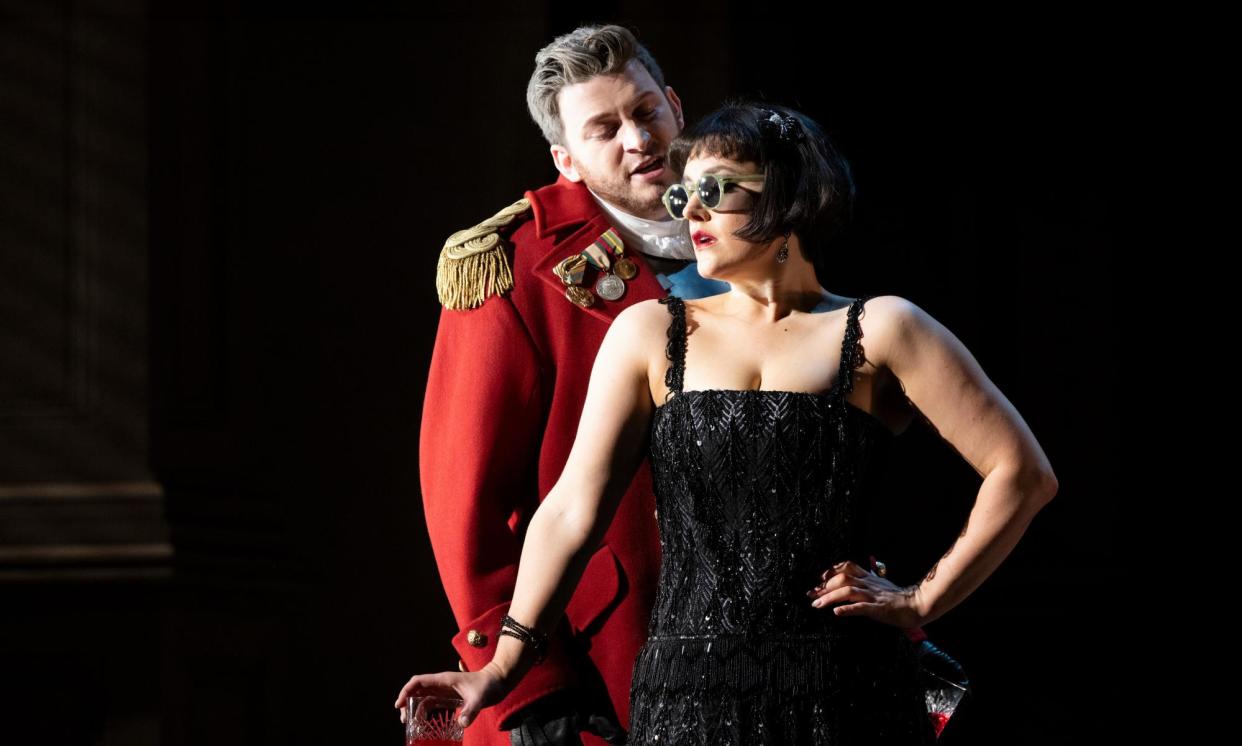The week in classical: Giulio Cesare; Così fan tutte; Siegfried/Götterdämmerung – review

On occasion an opera production stamps an imprint on a work so wholeheartedly that it becomes the audience’s touchstone for a generation. Jonathan Miller’s 1982 mafioso Rigoletto – New York gangsters and a juke-box-playing duke – wins out for ingenuity and box office success. (Dog-eared or not, it will return to the English National Opera in the autumn.) Glyndebourne’s 2005 staging of Handel’s Giulio Cesare (1724), directed by David McVicar, is another once seen, never forgotten hit. Last revived in 2018, Giulio Cesare is back and flying – revived by McVicar himself – with a first-class cast, the Handelian Laurence Cummings conducting a work he knows inside out, and the Orchestra of the Age of Enlightenment excelling in the pit. Handel’s score, among his best loved, overflows with star arias in every humour, from jubilant to sorrowful.
At the start, model clippers bobbing on sparkling, mechanical waves arouse complex impressions: toy theatre, island nation, seafaring power; imperial ambition, violence, war. Handel’s setting is the Roman-Egyptian war of 48-47BC. The victorious Caesar sails into Alexandria, only to encounter the tricky duo of Ptomely and Cleopatra, co-regent siblings and rivals. McVicar, with his design team led by Robert Jones, has updated the action, handsomely and eclectically, to Britain’s invasion of Egypt in 1882: red-coat soldiers, pith helmets and a prevalent Victorian attitude towards the declining Ottoman empire as a place of feminine “oriental” fantasy. Cleopatra and her entourage are dressed in sumptuous colours and bejewelled costumes (designed by Brigitte Reiffenstuel). Well-drilled physical detail and dance, with a nod to Bollywood, are key to the action (choreography by Andrew George). This is a long evening but with fun to be had, especially when the on-stage violinist Kati Debretzeni has a virtuosic standoff with Caesar, beating his vocal fireworks with dazzling trills and a big, fat pizzicato.
In 2005 Sarah Connolly sang Caesar as a trouser-role, opposite Danielle de Niese as the sexy, flapper-dress-wearing, umbrella-twirling Cleopatra (the performance is available on a Glyndebourne video. Now countertenors are to the fore: the American Aryeh Nussbaum Cohen plays Caesar, noble, susceptible, golden-toned, with the Persian-Canadian Cameron Shahbazi, in a notable Glyndebourne debut, as his sly enemy Tolomeo. The American Ray Chenez (Nireno) adds further countertenor prominence. A welcome low voice is that of the Italian bass baritone, Luca Tittoto, as the savage henchman, Achilla.
The finale of Giulio Cesare is happy and brief. Those extended outpourings of emotion are what remain
The British soprano Louise Alder nearly steals the show as Cleopatra, unerring vocally, every ornament or coloratura run beautifully placed. Two outstanding mezzo-sopranos, Scottish Beth Taylor (the bereaved Cornelia) and Bulgarian Svetlina Stoyanova (her son Sesto) shone, alone or together, in their heartfelt arias: grief expressed in music without equal. The finale of Giulio Cesare, thanks to some tactical juggling of historical fact, is happy and brief. Those extended outpourings of emotion are what remain.
Who can say where reality begins and ends in Così fan tutte (1790), the last of three collaborations between Mozart and the librettist Lorenzo da Ponte. It’s no surprise that the work, a sublime operatic conundrum, is always referred to by its Italian title, loosely meaning “all women are like that”. Not that anyone should take offence at the implied slur. This partner-swap opera shows, unblinkingly, that all men are like that too. Love has no guarantees. Jan Philipp Gloger’s 2016 production, revived at the Royal Opera House by Oliver Platt, labours the point. It also taxingly probes awkward questions about human intention and weakness, as expressed by Mozart’s soul-scouring music. Gloger and his designer, Ben Baur, take metatheatre to the point of exasperation: action happens onstage, back stage, below, off, under. Dorabella (Samantha Hankey) and Fiordiligi (Golda Schultz) drape their departed lovers’ clothes on wardrobe dummies. As the two couples face temptation, they are “on stage”, beneath a tree of knowledge, monster serpent twisting round the trunk, birds of prey hovering.
The staging is dark and claustrophobic, but Mozart’s score breathes freely and airily, as if presenting life’s darkest troubles with a blithe smile. Alexander Soddy, conducting, pressed the pace at the start but then settled in to brisk fluency, drawing exuberant orchestral solos from horns and woodwind. Schultz and Hankey, with Daniel Behle returning as Ferrando and Andrè Schuen as Guglielmo, Gerald Finley as Don Alfonso and Jennifer France as Despina, worked as magnificent equals in this ensemble cast.
The marathon which is Wagner’s Ring, four operas performed across seven days, ended at Longborough last weekend with Siegfried and Götterdämmerung, conducted by Anthony Negus and directed by Amy Lane. The gods met their doom; Brünnhilde (Lee Bisset) galloped into the flames to be united with the dead hero Siegfried (Bradley Daley); the gold, metaphor of worldly power and evil, was returned to the Rhine. The work’s complex symbolism surfaced without fuss through music and character. The entire cast, chorus of vassals (together with the Longborough Community Chorus) and 60-strong orchestra all contributed to the undertaking. In these last two operas, supporting characters have their moment: Adrian Dwyer’s wriggling Mime; Julian Close’s heinous, roaring Hagen, Benedict Nelson’s nuanced and cleverly maladroit Gunther, Laure Meloy’s credulous Gutrune) and Claire Barnett-Jones’s steadfast Waltraute.
The point of this Cotswolds Ring cycle is not whether it matches the standards, budgets or stage hullabaloo of the great opera houses of the world. Sometimes it does (surprisingly often), sometimes not. The scale of the endeavour, the commitment, the hard work – against odds – the high musical standards, and above all the response of the audience, many of whom will never hear a Ring cycle elsewhere: these are the things that matter.
Star ratings (out of five)
Giulio Cesare ★★★★
Così fan tutte ★★★
Siegfried/Götterdämmerung ★★★★

 Yahoo News
Yahoo News 
